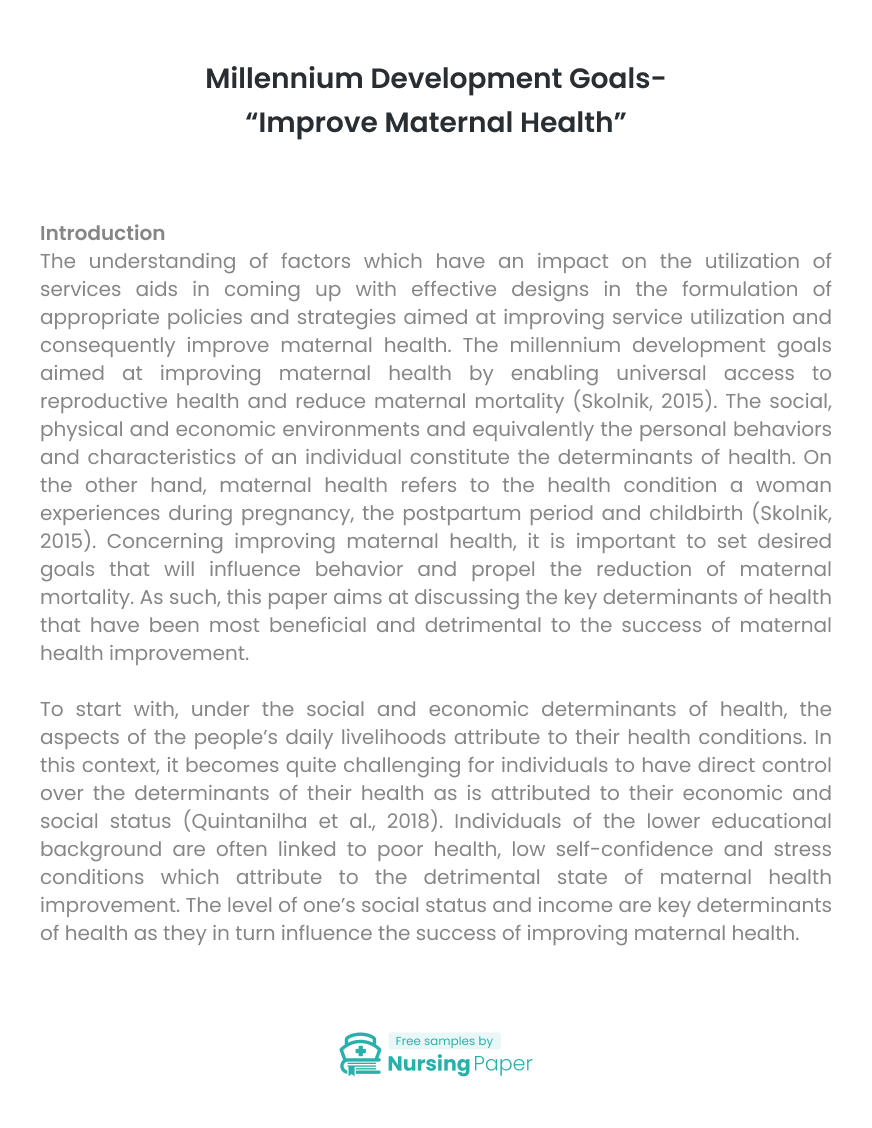
Millennium Development Goals- “Improve Maternal Health”
Introduction
The understanding of factors which have an impact on the utilization of services aids in coming up with effective designs in the formulation of appropriate policies and strategies aimed at improving service utilization and consequently improve maternal health. The millennium development goals aimed at improving maternal health by enabling universal access to reproductive health and reduce maternal mortality (Skolnik, 2015). The social, physical and economic environments and equivalently the personal behaviors and characteristics of an individual constitute the determinants of health. On the other hand, maternal health refers to the health condition a woman experiences during pregnancy, the postpartum period and childbirth (Skolnik, 2015). Concerning improving maternal health, it is important to set desired goals that will influence behavior and propel the reduction of maternal mortality. As such, this paper aims at discussing the key determinants of health that have been most beneficial and detrimental to the success of maternal health improvement.
To start with, under the social and economic determinants of health, the aspects of the people’s daily livelihoods attribute to their health conditions. In this context, it becomes quite challenging for individuals to have direct control over the determinants of their health as is attributed to their economic and social status (Quintanilha et al., 2018). Individuals of the lower educational background are often linked to poor health, low self-confidence and stress conditions which attribute to the detrimental state of maternal health improvement. The level of one’s social status and income are key determinants of health as they in turn influence the success of improving maternal health. Individuals of high social status and good income secure themselves better health which articulates to the gap between the rich and poor regarding acquiring health services (Skolnik, 2015). The access to health services determines the ability of improvement of maternal health as women of poor social and economic backgrounds suffer from a lack of effective health services during maternal care.


On the other hand, the physical environment is another key determinant of health as aided by the availability of fresh and clean air, safe water to drink and use, safe infrastructure and healthy working environments necessary in contributing to good health (Quintanilha et al., 2018). During maternal periods, it is essential that a woman stays in a clean and safe environment that supports their physical body and mental state in contributing to benefiting the improvement of maternal health. Also, having control over one’s working conditions contributes to maternal health improvement. However, lack of such suitable conditions dooms a risky environment for the health of the fetus and the mother which brings about the concept of detrimental maternal health.
Another key determinant of health is personal individual behaviors and characteristics. The inherited genetics of an individual plays a critical role in determining the healthiness of an individual, their lifespan and the probability of developing certain illnesses which affect the health of an individual (Skolnik, 2015). As such, this determines the ability of improvement or detrimental of maternal care as genetics factor cannot be easily controlled. Also, the behaviors of an individual with regard to smoking, keeping active and balanced diets significantly determine the health of an individual (Quintanilha et al., 2018). A woman who practices unhealthy routines such as smoking and drinking during pregnancy or the postpartum period is unlikely to contribute to the improvement of maternal health.
Conclusion
From the above discussion, it is evident that the improvement of maternal health is relatively dependent on the determinants of health. These key determinants include the social, economic, physical and personal behaviors and characteristics of an individual. Therefore, the success of maternal health improvement is significantly dependent on determinants of health.

1. Quintanilha, M., Mayan, M. J., Raine, K. D., & Bell, R. C. (2018). Nurturing maternal health in the midst of difficult life circumstances: a qualitative study of women and providers connected to a community-based perinatal program. BMC Pregnancy and Childbirth, 18(1), 314.
2. Skolnik, R. (2015). Global health 101. Burlington, MA: Jones & Bartlett Publishers. 3rd Ed.



The download will start shortly.

The download will start shortly.
 Subject:
Nursing
Subject:
Nursing  Number of pages: 2
Number of pages: 2  Subject:
Health and Social Care
Subject:
Health and Social Care  Number of pages: 3
Number of pages: 3  Subject:
Medicine
Subject:
Medicine  Number of pages: 3
Number of pages: 3  Subject:
Health and Social Care
Subject:
Health and Social Care  Number of pages: 4
Number of pages: 4  Subject:
Health and Social Care
Subject:
Health and Social Care  Number of pages: 3
Number of pages: 3  Subject:
Health and Social Care
Subject:
Health and Social Care  Number of pages: 9
Number of pages: 9  Subject:
Medicine
Subject:
Medicine  Number of pages: 6
Number of pages: 6  Subject:
Nursing
Subject:
Nursing  Number of pages: 5
Number of pages: 5  Subject:
Medicine
Subject:
Medicine  Number of pages: 7
Number of pages: 7  Subject:
Medicine
Subject:
Medicine  Number of pages: 3
Number of pages: 3  Subject:
Health and Social Care
Subject:
Health and Social Care  Number of pages: 2
Number of pages: 2  Subject:
Medicine
Subject:
Medicine  Number of pages: 5
Number of pages: 5  Subject:
Health and Social Care
Subject:
Health and Social Care  Number of pages: 3
Number of pages: 3  Subject:
Medicine
Subject:
Medicine  Number of pages: 3
Number of pages: 3  Subject:
Nursing
Subject:
Nursing  Number of pages: 7
Number of pages: 7 
